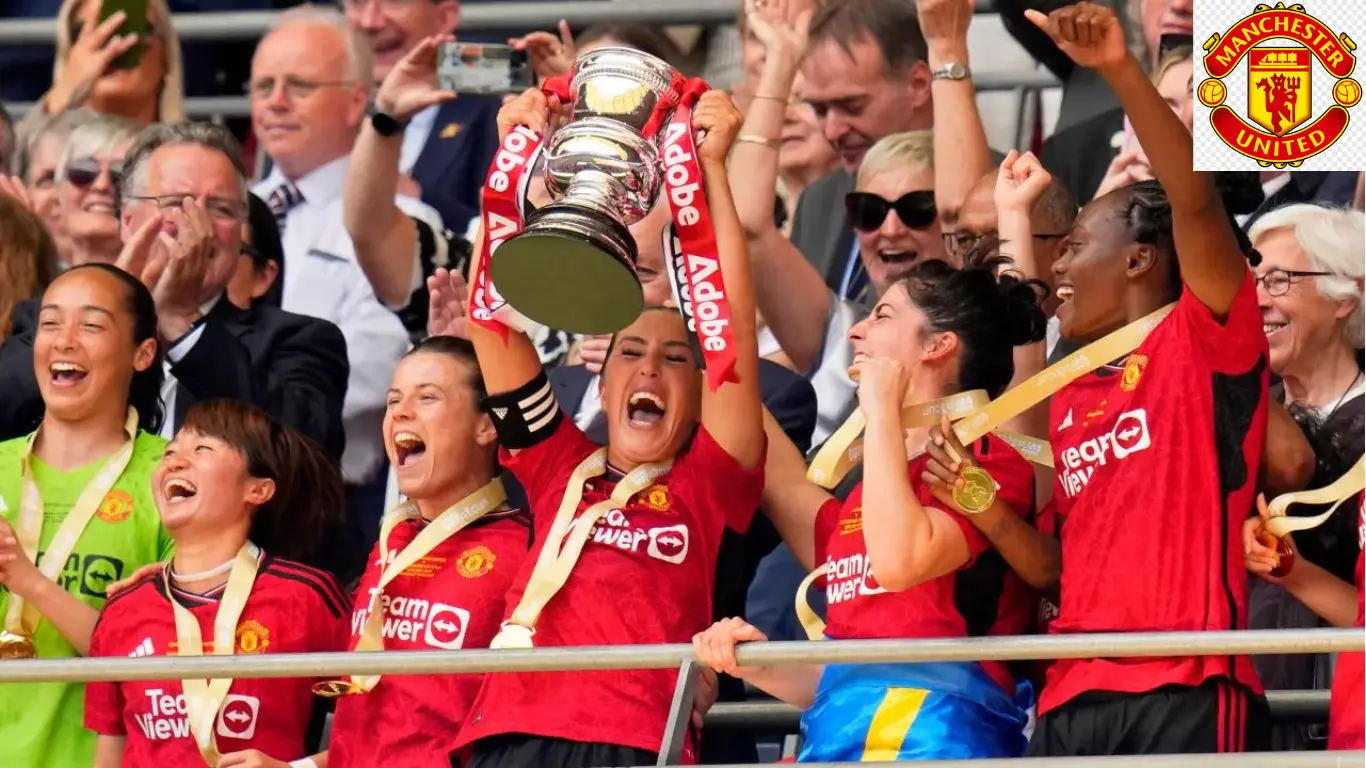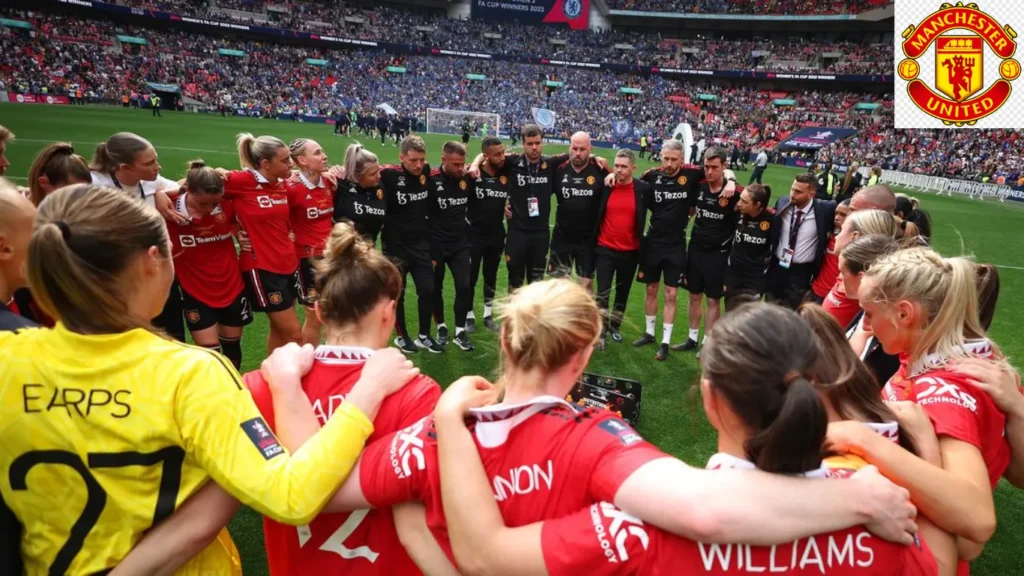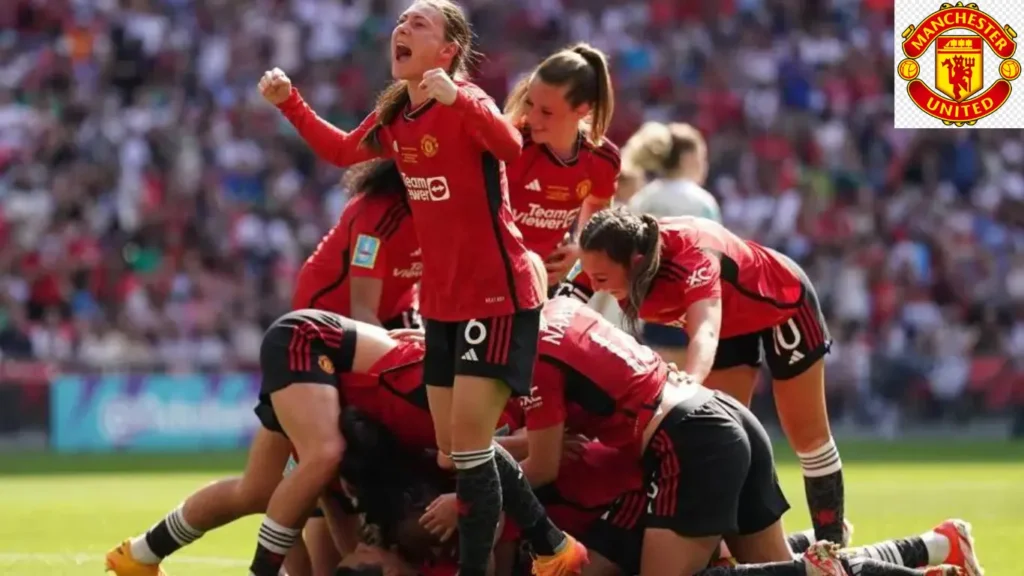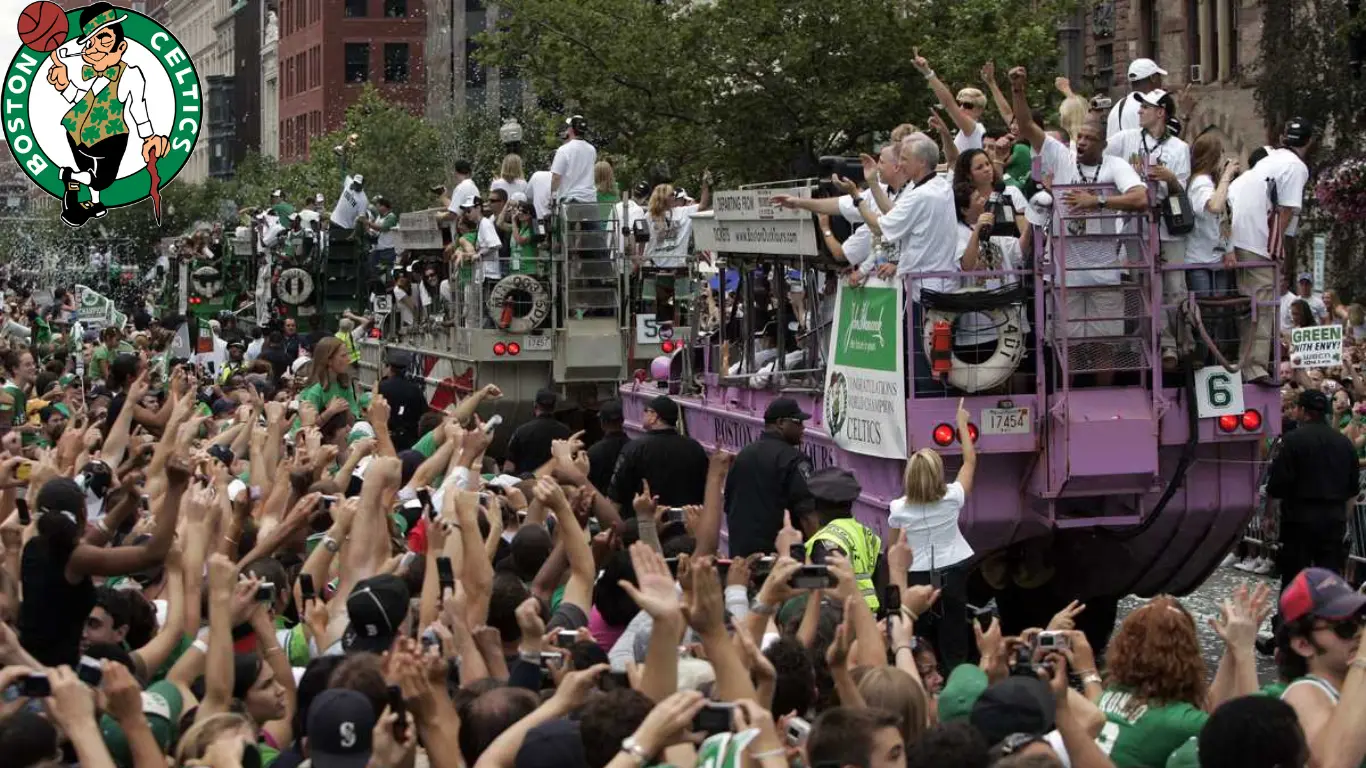Soccer
Manchester United Joins Elite Roster as 18th Women’s FA Cup Champions

In a packed Wembley Stadium, Manchester United wrapped up a challenging season on a high note. By clinching their inaugural trophy just six years after becoming a professional team.
Read More about: Manchester United achieved another milestone recently.
The winning moment came in the first half stoppage time with a remarkable goal from Ella Toone. Which propelling Manchester United into the lead in a match they controlled from the start. Toone, known for her knack of scoring at Wembley, once again showcased her talent on the grand stage.
The victory marked a significant milestone for Manchester United’s women’s team, showcasing their rapid rise and determination to succeed.
Grabbing the ball at the center of the field, Ella Toone swiftly veered to the right, setting herself up for a remarkable shot. With precision and finesse, she unleashed a breathtaking curling strike that soared into the top corner of Becky Spencer’s goal net.
This sensational goal not only secured the win. But also etched Toone’s name in Manchester United Women’s team history books as their top scorer, marking her 53rd goal for the club.
Nine minutes into the second half, Rachel Williams, the player whose goal in the semi-final secured Manchester United’s progression for the second consecutive season, showcased her skill once more. With her characteristic move, Williams headed in another goal from the back post, effectively doubling her team’s lead.

Then, just three minutes later, Lucía García seized on a misplaced pass from Spencer, making it look easy as she scored the third goal. With that decisive strike, any hope of a comeback vanished. By signaling the end of the contest and confirming Manchester United’s victory.
In their debut appearance in the Women’s FA Cup final, Tottenham Hotspur fought hard to mount a comeback. Around midway through the second half, their star player Beth England came close to scoring. By hitting the crossbar with a powerful header from a left wing cross. Despite this close call, Tottenham couldn’t find the breakthrough they desperately needed.
However, with just 15 minutes remaining, Lucía García struck again. This time seizing an opportunity in the penalty area to extend Manchester United’s lead to 4-0. This goal not only secured the win but also etched its place in history. Which marking the biggest winning margin in the Women’s FA Cup final since Arsenal’s 5-0 victory over Leeds United in 2006.
Today’s triumph marks a historic moment for Manchester United. As they become the first new champion of the Women’s FA Cup since their local rivals Manchester City claimed the title in 2017. The Women’s FA Cup, which has been contested since 1971, saw Manchester United’s victory break a streak of familiar winners.
In a curious twist of fate, the defeated finalists in Manchester United’s triumphant match were Birmingham City, a team previously managed by Marc Skinner.
Skinner, now at the helm of Manchester United, had experienced defeat at Wembley before, notably in the previous season against Chelsea. However, the 41-year-old coach finally found redemption, securing victory in his third attempt in the competition.
Skinner’s tenure as head coach at the club is coming to an end next month as his three-year contract expires. Over the past two seasons, under his guidance, the team has made significant progress. Which climbing from fourth to second place in the league standings. This impressive ascent also marked the club’s debut qualification for the Champions League, a historic achievement.
However, this season has been challenging, with the team appearing to regress rather than continue their upward trajectory.
Despite their previous successes, Manchester United has struggled to maintain their momentum. Which prompting questions about the direction of the team under Skinner’s leadership.
Manchester United’s hopes of making a mark in the Champions League were dashed before they even reached the lucrative group stage. They suffered a disappointing defeat to eventual semi-finalists Paris Saint-Germain in the qualifying round. By putting an early end to their European campaign.
Adding to their woes, Manchester United faced a series of setbacks in the Women’s Super League. The team endured a record six defeats throughout the season, including a recent loss to Liverpool.

These defeats have contributed to Manchester United’s slump to their lowest ever position in the league standings. Which currently sitting in fifth place with just one game left to play.
Despite facing significant challenges due to injuries to key players, Marc Skinner, Manchester United’s head coach. Which has come under fire for his inability to effectively incorporate new signings into the team and his perceived inflexibility in team selection. Critics argue that these issues have hindered the team’s performance throughout the season.
Interestingly, one of Manchester United’s standout players this season has been Grace Clinton. Who was sent out on loan by Skinner to today’s FA Cup final opponents, Tottenham Hotspur.
However, Skinner was fortunate that the terms of Clinton’s loan agreement rendered her ineligible to play against her parent club in the final. By sparing him potential scrutiny for loaning out a player who could have made a significant impact against Manchester United.
A growing sense of discontent has been brewing among Manchester United’s passionate fan base regarding Marc Skinner’s tactics and player management abilities. The unrest reached a boiling point during the team’s 3-1 defeat away to Chelsea in January. When a Manchester United supporter unfurled a banner calling for Skinner to be replaced.
The banner’s message served as a visible expression of the frustration felt by many fans towards Skinner’s leadership of the team.
It highlighted the increasing pressure on Skinner to deliver better results. Which address the concerns raised by supporters regarding the team’s performance under his management.
In certain respects, Marc Skinner’s current situation mirrors the pressure faced by the legendary Manchester United men’s manager, Sir Alex Ferguson, 35 years ago.
At that time, Ferguson was under immense scrutiny after failing to secure a trophy in his first two full seasons at the club.
The mounting pressure on Ferguson reached a crescendo. When a notable supporter unfurled a banner bearing the words, “3 Years of Excuses and it’s Still Crap Tara Fergie.”
This iconic moment encapsulated the frustration felt by fans towards Ferguson’s perceived lack of success. Which raised serious doubts about his future as the club’s manager.
Similarly, Skinner now finds himself in a similar predicament. With fans expressing discontent over the team’s performances and results under his leadership. The comparison serves as a reminder of the intense scrutiny and high expectations that come with managing a club as storied and revered as Manchester United.
Ferguson’s turbulent season took a remarkable turn when he clinched the FA Cup title. Which marking the beginning of an unprecedented era of dominance over English football that spanned 23 years. And saw Manchester United claim an astonishing 38 trophies. This period cemented Ferguson’s legacy as one of the greatest managers in football history.
Now, Marc Skinner can only hope to harness the formidable reputation and heritage of Manchester United. For establish their authority in the women’s game. With the club’s rich brand and history behind them. Skinner aims to lead his side to success and emulate the enduring legacy forged by Ferguson.
The emergence of a new Women’s FA Cup champion also signaled the end of a decade long era of domination by three teams in English women’s football. Since Liverpool’s Women’s Super League title triumph in October 2014, Arsenal, Chelsea, and Manchester City had collectively claimed all 29 domestic trophies on offer in the ten-year period.
This new victor injected fresh excitement into the landscape of women’s football. Which breaking the stronghold previously held by the trio of dominant clubs.
For the second year running, the Women’s FA Cup final achieved a remarkable feat by filling the iconic 90,000 seat National Stadium at Wembley. Following last year’s record breaking attendance of 77,390, this year’s final saw a turnout of 76,082 spectators on a glorious. As sun soaked afternoon in the heart of the English capital.
The impressive turnout underscored the growing popularity and significance of women’s football. As fans eagerly flocking to witness the thrilling showcase of talent on the grand stage of Wembley Stadium.
-

 Soccer4 months ago
Soccer4 months agoDutch Fans in Blackface to Imitate Ruud Gullit, One Agrees to Stop
-

 Soccer4 months ago
Soccer4 months agoEx Glamour Model Says Party with England Team Before Euros
-

 Soccer4 months ago
Soccer4 months agoArgentina vs Peru 2-0 Highlights & All Goals Copa America 2024
-

 News6 months ago
News6 months agoDubai Flood, Rain Turns Desert to Aquarium🌧️🐠
-

 NBA4 months ago
NBA4 months agoCelebrate with the Boston Celtics: Parade and Traffic Updates
-

 Soccer4 months ago
Soccer4 months agoUEFA EURO 2024: Essential Guide and Key Information
-

 Celebrity5 months ago
Celebrity5 months agoDavid Sanborn, American Alto Saxophonist, Died at Age 78
-

 Entertainment5 months ago
Entertainment5 months agoNorthern Lights Again Return near California-Oregon Border This Saturday
















Pingback: Allegri Urges Juventus, Prioritize Beyond Coppa Italia Final - Sports Groovy
Pingback: Tottenham vs Man City, Title Race Clash - Predictions & Tips - Sports Groovy